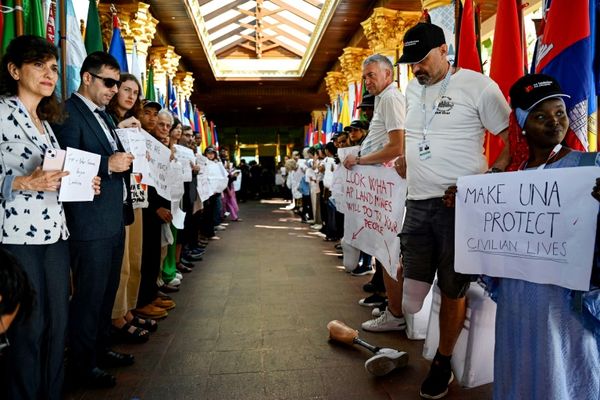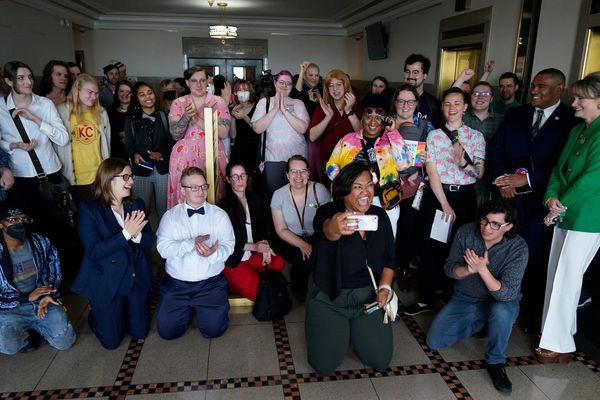WASHINGTON _ President Donald Trump said on Monday that Bahamian evacuees seeking refuge in the United States in the wake of Hurricane Dorian need "totally proper documentation" to enter the country despite his own Customs and Border Patrol head saying otherwise just two hours earlier.
The inconsistency fueled confusion that started Sunday night when a group of Bahamian refugees were blocked from boarding a ferry bound for Fort Lauderdale. Republican and Democratic lawmakers have asked the White House to clarify its policy as tens of thousands board ships and planes bound for Florida.
"Everybody needs totally proper documentation," Trump said on the South Lawn of the White House. "The Bahamas has some tremendous problems with people going to the Bahamas that weren't supposed to be there. I don't want to allow people that weren't supposed to be in the Bahamas to come into the United States, including some very bad people and some very bad gang members and some very, very bad drug dealers."
Hurricane Dorian devastated the Bahamas last week, ravaging the island nation for over 40 hours with record Category 5 winds. But "large sections of the Bahamas were not hit," the president contended. "And we are not allowing those people from the sections that were not hit."
Earlier in the afternoon, acting Commissioner of Customs and Border Protection Mark Morgan told reporters in a press briefing that the agency was processing entrants without documentation.
"This is a humanitarian mission, right?" Morgan said.
"If your life is in jeopardy _ you're in the Bahamas, and you want to get to the United States _ you're going to be allowed to come to the United States, right? Whether you have travel documents or not," he said. "We've already processed people that have travel documents and don't have travel documents."
The confusion began when more than 100 Bahamian evacuees were abruptly kicked off a Fort Lauderdale-bound ferry in Freeport late Sunday night.
The decision, according to U.S. Customs and Border Protection, was not CBP's, the agency said Monday. A spokesperson for CBP said the 103 Bahamians who were not allowed to travel did not have any kind of identification.
"If they didn't have IDs, they would have to go to a very lengthy process," the spokesperson said. "What really happened was the ferry operator knew the ferry would be held because the passengers would have to go through a very lengthy process once at the port, about 12 hours. That would have kept the boat from going back to pick up passengers, and the company didn't want that. So they told them to get off."
Morgan said he had authorized the deployment of "an enormous amount of resources to Southern Florida" to receive people arriving from the Bahamas. CBP is conducting its typical vetting process for entrants into the country, examining criminal records that might deem some individuals inadmissible, he added.
"Already we've received two cruise ships � thousands of folks that we have processed," Morgan stated, referencing at least one ship carrying 1,400 people that was processed in a matter of hours. "Flights are coming in constantly. We've deployed additional folks out to even a small airport. We're reaching out to the aviation companies and corporations to coordinate. We're coordinating with the cruise ships."
No special hurricane-related guidance has been issued on CBP's website, which lists document requirements for Bahamians entering the country by air, but not by sea.
Democrats and Republicans from Florida urged the administration to clear up the confusion on Monday.
"We need to get to bottom of this as soon as possible," U.S. Rep. Donna Shalala, D-Miami, said. "However, I do believe that turning away our Bahamian neighbors from temporarily entering the US after they have lost everything in Hurricane Dorian is unconscionable and goes against everything our country stands for."
Republican Sens. Marco Rubio and Rick Scott urged the administration to clarify visa requirements for Bahamians. They both want visa requirements waived for Dorian survivors.
"It's important Customs and Border Protection and the Bahamian government work together to clarify the current rules regarding visas in the Bahamas," Scott said in a statement. "As hundreds of thousands of Bahamians seek refuge or start to rebuild after Hurricane Dorian, we cannot have the kind of confusion that occurred last night in Freeport."
And Florida lawmakers are also asking the U.S. government to provide additional resources for the Bahamas' recovery effort.
Rubio requested the hospital ship USNS Comfort to be deployed to the Bahamas, a massive ship can host as many as 1000 patients on board, has the equipment and technology to perform complex surgeries and has distilling plant on board to make drinking water from sea water.
He made the request after visiting the Bahamas on Friday, where he said parts of the Abaco Islands and Grand Bahama looked like a bomb exploded after Hurricane Dorian made landfall.
A spokesperson for Rubio noted that the senator spoke with Southern Command commander Adm. Craig Faller on Thursday about potentially sending the U.S. Navy hospital ship Comfort to the Bahamas.
So far, the Bahamian government has not requested the ship to come, a defense official told McClatchy.
Rubio has also asked the State Department and USAID to conduct an internal aid assessment, so the agencies can tell Congress how much money they have to spend on disaster assistance in the Bahamas. While Congress gives billions in disaster funds to agencies like the Federal Emergency Management Agency and the Department of Housing and Urban Development after natural disasters in the United States, a response to a disaster on foreign soil comes out of USAID's foreign aid budget.
The results of the assessment will help Congress determine whether USAID and the State Department need more money for disaster response, Rubio's office said.
"What we want them to do is a full assessment of how much money is in the account and how much money they will need," Rubio spokesperson Nick Iacovella said.
Scott also asked for CBP personnel to be present at ports of entry in the Bahamas to assist people trying to leave the country for the United States.
"Professionals should be on site to help the many Bahamians trying to leave destruction," Scott said.
Trump administration officials aware of the senators' criticisms are pushing back, outlining an expansive interagency effort that extends across a dozen government agencies.
Officials familiar with the effort told McClatchy that senior-level meetings continued today on the effort to support the Bahaman government response, and that the National Security Council will continue to host coordinating meetings throughout the week.
At the Pentagon Monday, spokesman Jonathan Hoffman said the U.S. military has significantly stepped up its support for the relief effort in the Bahamas.
Hoffman said that the process for relief requests is that the Bahamian government will ask the Office of Foreign Disaster Assistance at the U.S. Agency for International Development for capabilities it needs, such as airlift, and then those requests are sent to U.S. Northern Command to fulfill.
"Northcom received 30 relief requirement request and it is actively fulfilling those requests," Hoffman said. The U.S. response has grown to 1200 deployed or ready to deploy active duty forces and 30 Army and Navy helicopters fulfilling logistics, airfield assessment, transportation and humanitarian mission roles, including conducting rescues of eight Bahamian residents, he said.. So far, air field assessment teams that flew in via four MV-22 Ospreys from the USS Bataan have completed the evaluation of Grand Bahama International Airport and reported the field as C-130 and C-17 capable," Hoffman said.
The United States may further expand its role as well, Hoffman said, to manage airspace around the islands as multiple contracted and military relief efforts increase their presence there.
"We are pursuing options to assist in airspace deconfliction as well," Hoffman said.
USAID administrator Mark Green surveyed the devastation by air on Sunday and compared the sight to a nuclear wasteland.
"What we're doing right now is the immediate," Green continued. "Got to help get electricity going. Try to help them get communications, water, sanitation, hygiene. They've got a big rebuilding effort ahead of them in the weeks and months that are ahead. And we need to help them. We want to help."
The administration was swift to send a team of experts to the country in the hours after the storm moved north from the Bahamas along the U.S. coastline, making landfall in North Carolina's Outer Banks.
But Green, too, acknowledged criticisms of the response time.
"You know, I understand why people get frustrated, particularly in those early days," Green said. "The important thing is to make sure we're doing this the right way. Again, the Government of the Bahamas leading, but also making sure we do an assessment to get what's needed, where needed, as needed."
The administration has the ability to grant Bahamians already in the United States and unable to return due to natural disasters or armed conflict a temporary protected status to remain here.
Adding to the conflicting information, Morgan said he thought it would be "appropriate" to recommend the president grant TPS to Bahamians, even though the Bahamian government has not requested it. Shalala said Congress and the administration should grant TPS immediately if the Bahamian government asks for it.
U.S. Rep. Frederica Wilson, D-Fla., who visited the Bahamas on Sunday, said there's going to be a long road ahead for disaster recovery, and the U.S. government will need to play a role.
"The entire electrical grid needs to be rebuilt, roads have to be rebuilt," Wilson said. "Everything has to be leveled and the debris removed so can rebuild. It's almost like rebuilding South Dade after Andrew."







